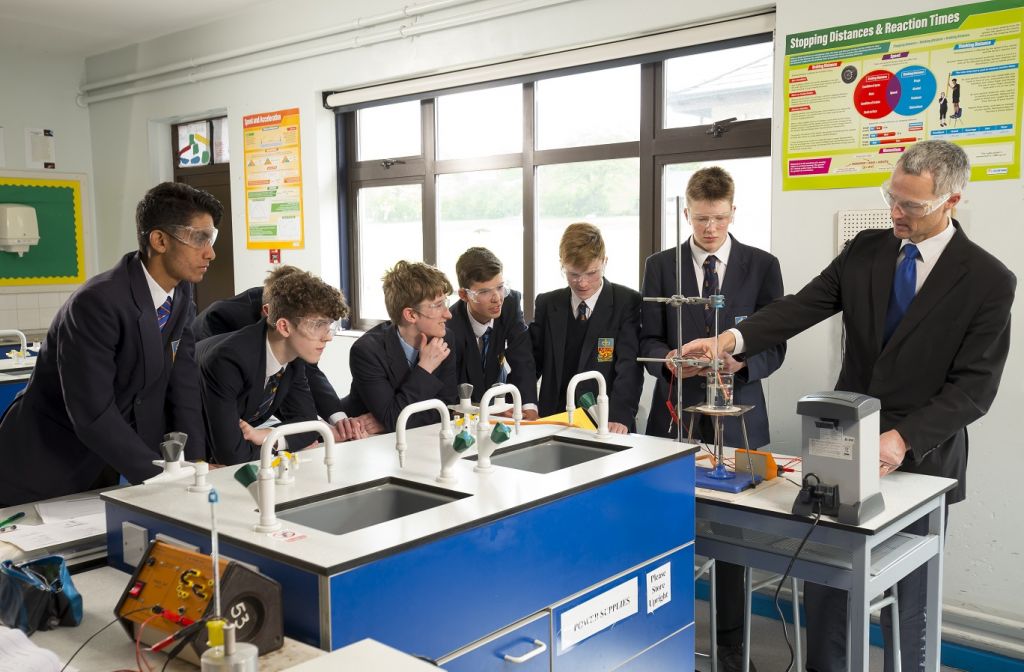Physics
The Physics Department is located on the upper site. Four of our laboratories are in the Mawby Building and one in the Timberlake Building. A central Preparation Room and workshop provides the support services and acts as a base for the technicians.
The Department is well equipped and the emphasis in lessons is to include as much practical work as is possible. A large number of students choose to study Physics GCSE and at A level. We currently have four sets in each of the Lower Sixth and Upper Sixth years. We achieve excellent results in exams and plenty of students go on to study Physics, Engineering or other similar subjects at university.
The aim of the Physics Department at Lancaster Royal Grammar School is to develop individual students to their full potential, to educate them in all aspects of the theory of physics and its many applications to everyday life in the real world.

Staff profiles
Mr S Bell, Head of Department- Mr Bell teaches Physics across the age range. Mr Bell started at LRGS in 2009. Before that he taught at QES in Kirkby Lonsdale, at Hutton Grammar School and in Zimbabwe. He enjoys outdoor activities, especially standing on the top of mountains.
Mr M J English joined LRGS from Bedford Modern School where he taught Physics for seven years. Earlier in Canada he was involved in Positron Emission Tomography (PET) research. Initially he obtained a BSc in Physiology from King's College, London followed by a BSc in Physics and an MSc in Medical Radiation Physics, both from McGill University, Canada.
Dr D R Rowe joined LRGS in 1994, after completing a PhD at Lancaster University. He is Assistant Head (Information and Systems). He is the officer in charge of the Army Section of the CCF and teaches Physics to all year groups. He is the Science Coordinator with responsibility for the Primary School Science programme.
Dr A Shawcross joined LRGS in September 2004, having spent three years teaching physics at Dallam School. He teaches physics to all year groups, he manages the school's Duke of Edinburgh Award scheme and he runs the annual Year 7 residential trip. Dr Shawcross also enjoys rock climbing and other adventurous activities.
Mr T M Hynes joined LRGS in 2022 having spent four years teaching physics in South Yorkshire. He possesses an MPhys from Durham University and an MA in Education from The University of Sheffield. Mr Hynes is also keen jazz listener and outdoor enthusiast who can often be found cycling and walking in the hills.
Email Physics Department staff
Key Stage 3
All pupils in each of the first three years study each of Physics. In Year 7 there are four lessons a fortnight and in Year 8 three lessons a fortnight.
- Forces and their Effects
- Energy Types and Resources
- Heat
- Electricity and Magnets
- Light and Sound
- Space
Is there much opportunity to do practical work?
In addition to covering the topics outlined above, the Key Stage 3 course also covers practical and other scientific skills like researching information and looking at the history of science. Practical experiments and investigations are routinely undertaken to enhance scientific methodology and concepts. These skills build and enhance both future work and basic scientific literacy.
Key Stage 4
In Year 10 the vast majority of pupils choose to study Physics GCSE (Edexel). There is an option to study Combined Science where Physics is taught as part of the Trilogy.
Physics - Sixth Form
Sixth Form Curriculum
In the Sixth Form we offer the AQA Physics.
Sixth Form Extra-curricular Projects
The Institute of Physics organises the Physics Olympiad Competition and this has been routinely entered with great success for several years by students in their L6 and U6 Year. Many students gain awards including the gold award for being in the top 50 students nationally.
Sixth Form FAQs
Where can I find out more?
The examination board (AQA) has a very useful website in which the full specification, past papers and mark schemes, guidance and examiner’s reports can all be found. The address is www.aqa.org.uk
